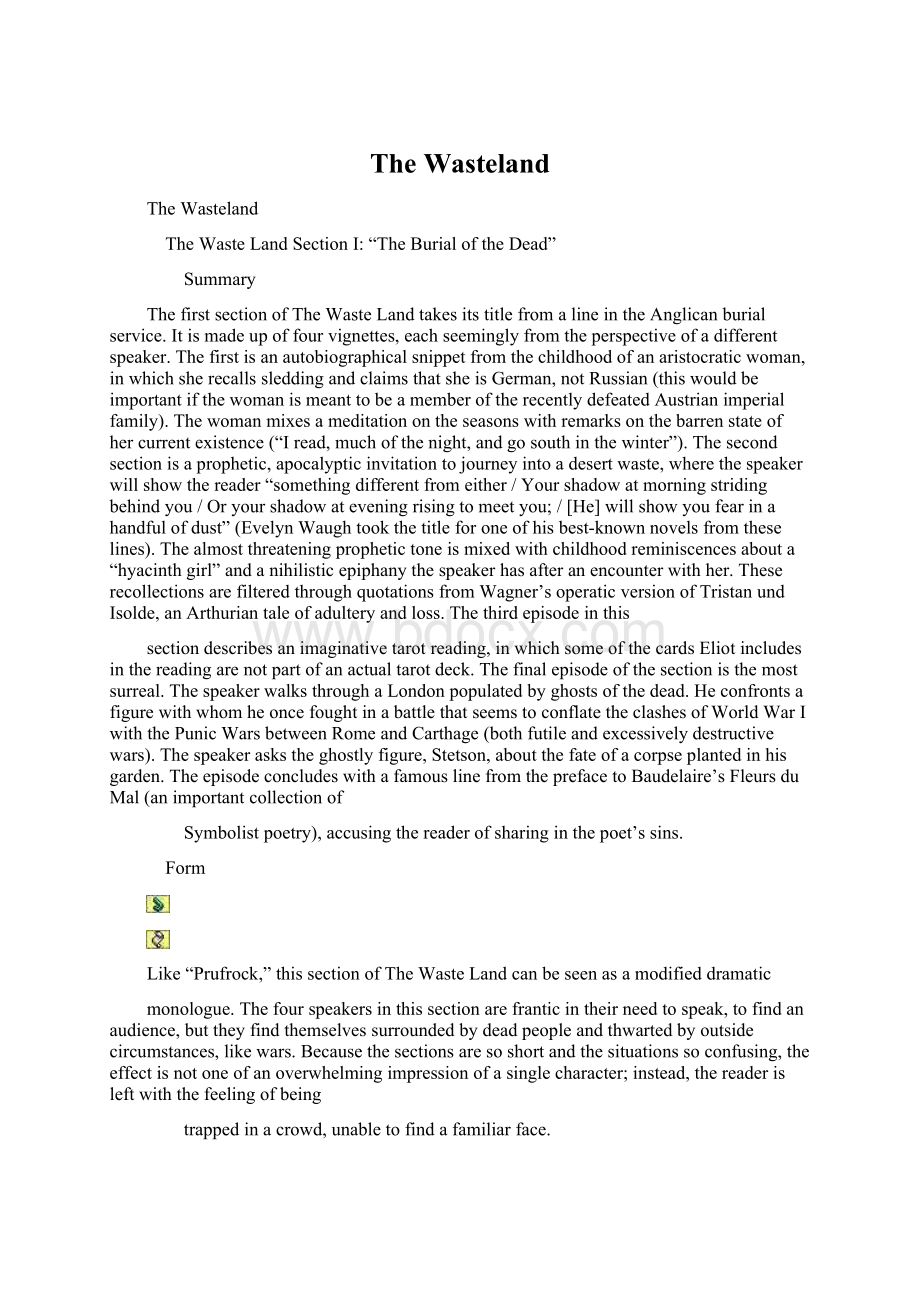The WastelandWord格式文档下载.docx
《The WastelandWord格式文档下载.docx》由会员分享,可在线阅读,更多相关《The WastelandWord格式文档下载.docx(7页珍藏版)》请在冰豆网上搜索。

/[He]willshowyoufearinahandfulofdust”(EvelynWaughtookthetitleforoneofhisbest-knownnovelsfromtheselines).Thealmostthreateningprophetictoneismixedwithchildhoodreminiscencesabouta“hyacinthgirl”andanihilisticepiphanythespeakerhasafteranencounterwithher.TheserecollectionsarefilteredthroughquotationsfromWagner’soperaticversionofTristanundIsolde,anArthuriantaleofadulteryandloss.Thethirdepisodeinthis
sectiondescribesanimaginativetarotreading,inwhichsomeofthecardsEliotincludesinthereadingarenotpartofanactualtarotdeck.Thefinalepisodeofthesectionisthemostsurreal.ThespeakerwalksthroughaLondonpopulatedbyghostsofthedead.HeconfrontsafigurewithwhomheoncefoughtinabattlethatseemstoconflatetheclashesofWorldWarIwiththePunicWarsbetweenRomeandCarthage(bothfutileandexcessivelydestructivewars).Thespeakeraskstheghostlyfigure,Stetson,aboutthefateofacorpseplantedinhisgarden.TheepisodeconcludeswithafamouslinefromtheprefacetoBaudelaire’sFleursduMal(animportantcollectionof
Symbolistpoetry),accusingthereaderofsharinginthepoet’ssins.
Form
Like“Prufrock,”thissectionofTheWasteLandcanbeseenasamodifieddramatic
monologue.Thefourspeakersinthissectionarefranticintheirneedtospeak,tofindanaudience,buttheyfindthemselvessurroundedbydeadpeopleandthwartedbyoutsidecircumstances,likewars.Becausethesectionsaresoshortandthesituationssoconfusing,theeffectisnotoneofanoverwhelmingimpressionofasinglecharacter;
instead,thereaderisleftwiththefeelingofbeing
trappedinacrowd,unabletofindafamiliarface.
Alsolike“Prufrock,”TheWasteLandemploysonlypartialrhymeschemesandshortburstsof
structure.Thesearemeanttoreference—butalsorework—theliterarypast,achievingsimultaneouslyastabilizingandadefamiliarizingeffect.TheworldofTheWasteLandhassome
parallelstoanearliertime,butitcannotbeapproachedinthesameway.TheinclusionoffragmentsinlanguagesotherthanEnglishfurthercomplicatesmatters.Thereaderisnotexpectedtobeabletotranslatetheseimmediately;
rather,theyareremindersofthecosmopolitannatureoftwentieth-centuryEuropeandofmankind’sfateaftertheTowerofBabel:
Wewillneverbeableto
perfectlycomprehendoneanother.
1
Commentary
NotonlyisTheWasteLandEliot’sgreatestwork,butitmaybe—alongwithJoyce’sUlysses—the
greatestworkofallmodernistliterature.Mostofthepoemwaswrittenin1921,anditfirstappearedinprintin1922.Asthepoem’sdedicationindicates,EliotreceivedagreatdealofguidancefromEzraPound,whoencouragedhimtocutlargesectionsoftheplannedworkandtobreakuptherhymescheme.RecentscholarshipsuggeststhatEliot’swife,Vivien,alsohadasignificantroleinthepoem’sfinalform.Alongworkdividedintofivesections,TheWasteLand
takesonthedegradedmessthatEliotconsideredmodernculturetoconstitute,particularlyafterthefirstWorldWarhadravagedEurope.AsignofthepessimismwithwhichEliotapproacheshissubjectisthepoem’sepigraph,takenfromtheSatyricon,inwhichtheSibyl(awomanwith
propheticpowerswhoagesbutneverdies)looksatthefutureandproclaimsthatsheonlywantstodie.TheSibyl’spredicamentmirrorswhatEliotseesashisown:
Helivesinaculturethathasdecayedandwitheredbutwillnotexpire,andheisforcedtolivewithremindersofitsformerglory.Thus,theunderlyingplotofTheWasteLand,inasmuchasitcanbesaidtohaveone,
revolvesaroundEliot’sreadingoftwoextraordinarilyinfluentialcontemporarycultural/anthropologicaltexts,JessieWeston’sFromRitualtoRomanceandSirJamesFrazier’s
TheGoldenBough.Bothoftheseworksfocusonthepersistenceofancientfertilityritualsinmodernthoughtandreligion;
ofparticularinteresttobothauthorsisthestoryoftheFisherKing,whohasbeenwoundedinthegenitalsandwhoselackofpotencyisthecauseofhiscountrybecomingadesiccated“wasteland.”HealtheFisherKing,thelegendsays,andthelandwillregainitsfertility.AccordingtoWestonandFrazier,healingtheFisherKinghasbeenthesubjectofmythictalesfromancientEgypttoArthurianEngland.EliotpicksuponthefigureoftheFisherKinglegend’swastelandasanappropriatedescriptionofthestateofmodernsociety.Theimportantdifference,ofcourse,isthatinEliot’sworldthereisnowaytohealtheFisherKing;
perhapsthereisnoFisherKingatall.Thelegend’simperfectintegrationintoamodernmeditationhighlightsthelackofaunifyingnarrative(likereligionormythology)inthemodernworld.
Eliot’spoem,liketheanthropologicaltextsthatinspiredit,drawsonavastrangeofsources.EliotprovidedcopiousfootnoteswiththepublicationofTheWasteLandinbookform;
thesearean
excellentsourcefortrackingdowntheoriginsofareference.ManyofthereferencesarefromtheBible:
atthetimeofthepoem’swritingEliotwasjustbeginningtodevelopaninterestinChristianitythatwouldreachitsapexintheFourQuartets.TheoverallrangeofallusionsinThe
WasteLand,though,suggestsnooverarchingparadigmbutratheragrabbagofbrokenfragmentsthatmustsomehowbepiecedtogethertoformacoherentwhole.WhileEliotemploysadeliberatelydifficultstyleandseemsoftentofindthemostobscurereferencepossible,hemeanstodomorethanjustfrustratehisreaderanddisplayhisownintelligence:
Heintendstoprovidea
mimeticaccountoflifeintheconfusingworldofthetwentiethcentury.
TheWasteLandopenswithareferencetoChaucer’sCanterburyTales.Inthiscase,though,April
isnotthehappymonthofpilgrimagesandstorytelling.Itisinsteadthetimewhenthelandshouldberegeneratingafteralongwinter.Regeneration,though,ispainful,foritbringsbackremindersofamorefertileandhappierpast.Inthemodernworld,winter,thetimeofforgetfulnessandnumbness,isindeedpreferable.Marie’schildhoodrecollectionsarealsopainful:
thesimpleworldofcousins,sledding,andcoffeeintheparkhasbeenreplacedbyacomplexsetofemotionaland 2
politicalconsequencesresultingfromthewar.Thetopicofmemory,particularlywhenitinvolvesrememberingthedead,isofcriticalimportanceinTheWasteLand.Memorycreatesa
confrontationofthepastwiththepresent,ajuxtapositionthatpointsoutjusthowbadlythingshavedecayed.Mariereadsformostofthenight:
ostracizedbypolitics,sheisunabletodomuch
else.Toreadisalsotorememberabetterpast,whichcouldproduceacoherentliteraryculture.
Thesecondepisodecontainsatroubledreligiousproposition.Thespeakerdescribesatruewastelandof“stonyrubbish”;
init,hesays,mancanrecognizeonly“[a]heapofbrokenimages.”Yetthesceneseemstooffersalvation:
shadeandavisionofsomethingnewanddifferent.Thevisionconsistsonlyofnothingness—ahandfulofdust—whichissoprofoundastobefrightening;
yettruthalsoresideshere:
NolongerareligiousphenomenonachievedthroughChrist,truthisrepresentedbyamerevoid.Thespeakerremembersafemalefigurefromhispast,withwhomhehasapparentlyhadsomesortofromanticinvolvement.Incontrasttothepresentsettinginthedesert,hismemoriesarelush,fullofwaterandbloomingflowers.Thevibrancyoftheearlierscene,though,leadsthespeakertoarevelationofthenothingnesshenowofferstoshowthereader.Againmemoryservestocontrastthepastwiththepresent,buthereitalsoservestoexplodetheideaofcoherenceineitherplace.Intheepisodefromthepast,the“nothingness”ismoreclearlyasexualfailure,amomentofimpotence.Despitetheoverallfecundityandjoyofthemoment,noreconciliation,and,therefore,noaction,ispossible.Thisinturnleadsdirectlytothedesertwasteofthepresent.Inthefinallineoftheepisodeattentionturnsfromthedeserttothesea.Here,theseaisnotalocusforthefearofnothingness,andneitherisitthelocusforaphilosophicalinterpretationofnothingness;
rather,itisthesiteoftrue,essentialnothingnessitself.ThelinecomesfromasectionofTristanundIsoldewhereTristanwaitsforIsoldetocomeheal
him.Sheissupposedlycomingbyshipbutfailstoarrive.Theoceanistrulyempty,devoidofthe
possibilityofhealingorrevelation.
ThethirdepisodeexploresEliot’sfascinationwithtransformation.ThetarotreaderMadameSosostrisconductsthemostoutrageousformof“reading”possible,transformingaseriesofvaguesymbolsintopredictions,manyofwhichwillcometrueinsucceedingsectionsofthepoem.Eliottransformsthetraditionaltarot